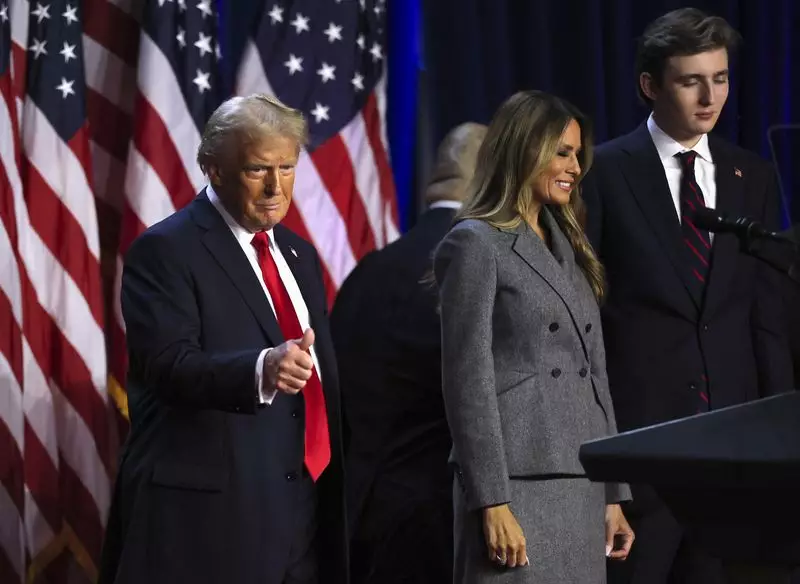The recent U.S. presidential election saw Donald Trump emerge victorious, spelling the potential for another tumultuous chapter in Sino-American relations. As the world watches this dynamic unfold, China’s leadership is bracing itself for a series of challenges that could radically reshape its global strategy. This article delves into how Beijing is assessing Trump’s return to the White House and what it means for the international stage, particularly in terms of trade, technology, and geopolitical alliances.
With Trump’s win, there is a palpable apprehension within Chinese policy circles. Analysts have noted that, despite Trump’s rhetoric and unpredictable nature, Beijing was not entirely blindsided by his victory. As Tong Zhao, a senior fellow at the Carnegie Endowment for International Peace, points out, while Trump’s win is not Beijing’s desired outcome, it aligns with their strategic expectation of a challenging U.S. administration. The need for China to project strength while maintaining a semblance of cordiality in diplomacy with the U.S. is critical.
Experts stress the importance of adaptability in China’s foreign policy as it navigates the upcoming challenges. The Trump administration’s track record suggests a consistency in its confrontational stance towards China, particularly regarding trade tariffs and technology restrictions. Therefore, Chinese strategists are likely to adopt a pragmatic approach, balancing aggression with diplomacy to safeguard national interests.
The looming threat of economic confrontation is likely to intensify under Trump, who has previously signaled intentions to impose tariffs exceeding 60% on Chinese goods and reassess China’s trading status. For Beijing, which relies heavily on the U.S. market—selling over $400 billion worth of goods annually—such a spiral into a trade war poses serious economic risks. The ramifications extend beyond mere numbers; a prolonged trade conflict could destabilize China’s economy, exacerbate internal issues, and potentially lead to domestic unrest.
Furthermore, the prospect of a decoupling strategy could disrupt the technological advancements China has been pursuing. Analysts say that if Trump accelerates his agenda of decoupling interlinked economies and supply chains, it could lead to significant setbacks for China’s ambitions in tech sectors, pushing the nation to adopt a path towards greater self-sufficiency. The necessity to foster domestic innovation while seeking alternative economic partnerships is paramount for maintaining stability.
As Trump’s “America First” approach prioritizes isolationism and transactional relations, China could see this as an opportunity to enhance its influence globally. The vacuum left by the U.S. might prompt Beijing to strengthen ties with countries in the Global South, as well as rekindle relationships with European and Northeast Asian nations. This strategy aligns with China’s broader goal of asserting itself as a global leader.
Recent diplomatic moves, including China’s efforts to improve relations with India under Modi’s administration and tentative overtures towards Japan, indicate a proactive stance aimed at mitigating the pressures from a Trump presidency. Such moves showcase China’s intention to fill the void that the U.S. might leave in multilateral engagement.
Geopolitical Ramifications
One of the most significant challenges anticipated under Trump is the approach towards Taiwan. China remains vigilant regarding U.S. arms sales to Taiwan and military posturing in the region, which threaten its sovereignty claims. Experts suggest that Trump’s presidency may resonate with an escalated military presence in the Taiwan Strait, altogether complicating an already fraught relationship. Shen Dingli, an international relations scholar, highlights the stark contrast between Trump and Biden’s approaches toward Taiwan, emphasizing the delicate balance that China must maintain to defend its interests while avoiding direct confrontation.
In light of all these developments, the Chinese leadership seems to be preparing for a multifaceted strategy. Aside from bolstering their military capacities, they could prioritize diplomacy with other nations to counterbalance U.S. influence aggressively.
The Road Ahead
As the stages of international politics are re-mapped following Trump’s return, China will have to navigate a complex landscape of competition, cooperation, and confrontation. The uncertainties tied to Trump’s policies necessitate a careful recalibration of Beijing’s strategies across the board. By tapping into new alliances and bolstering economic resilience, China aims to weather the impending storm of superpower rivalry while seizing opportunities amid shifting geopolitical tides.
While there is much to anticipate regarding Sino-U.S. dynamics, it is also clear that the interplay of global power will continue to evolve, shaping the future under the Trump administration. The coming years will not only test China’s strategic agility but also serve as a testament to its aspirations for greater global prominence in an increasingly fragmented world.


Leave a Reply